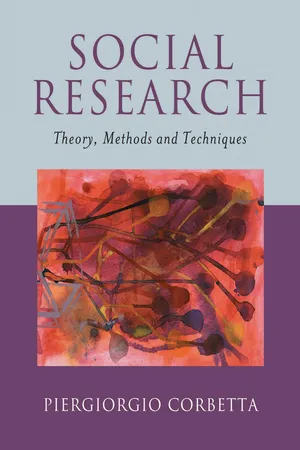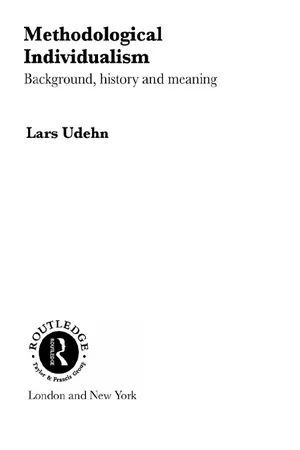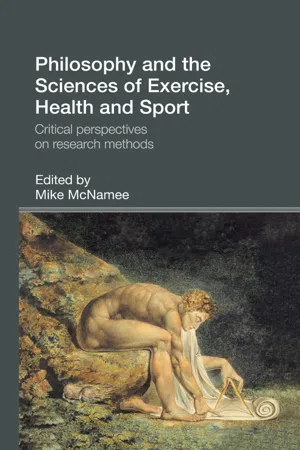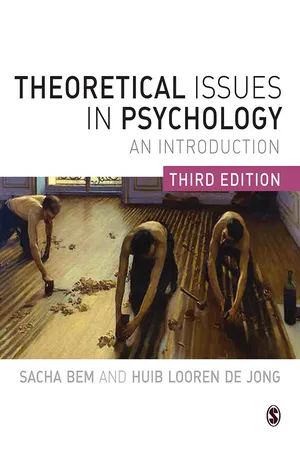Social Sciences
Positivism and Interpretivism
Positivism and interpretivism are two contrasting approaches in social sciences. Positivism emphasizes the use of scientific methods and empirical evidence to study social phenomena, aiming for objectivity and generalizability. In contrast, interpretivism focuses on understanding the subjective meanings and interpretations of individuals, often using qualitative methods to explore the complexities of human behavior and social interactions.
Written by Perlego with AI-assistance
Related key terms
10 Key excerpts on "Positivism and Interpretivism"
- eBook - ePub
- Neil Thompson(Author)
- 2017(Publication Date)
- Routledge(Publisher)
The links between social science and social work are generally taken for granted as the basis for social work education. The inherent contradictions and incompatible perspectives are taken on board and somehow welded together into a framework for practice. This is probably achieved by examining each theory only to a limited extent. I shall return to this point below when I consider eclecticism, but it is sufficient at this point to note the complex, tangled web of interrelationships between social science theories and social work. To talk in terms of a straightforward relationship between the two is a gross oversimplification.Within the social sciences there are two main philosophical approaches to the nature and purpose of science. These are the positivist and the hermeneutical (or phenomenological). It is worth examining each of these further.PositivismPositivism is characterised by the belief that social science can be carried out in a parallel fashion to the natural sciences. That is, positivists argue that general laws of causality can be deduced by studying social phenomena in a rigorous, objective and value-free way. Nick Heather (1976) comments:… the term positivism is used to refer to a broadly defined movement in the history of man’s intellectual development, the distinguishing feature of which is the attempt to apply to the affairs of man the methods and principles of the natural sciences, (p. 13 )This has a number of significant implications. First, it denies human freedom by assuming that all behaviour is determined by biological, psychological or social factors. Second, it is assumed that empirical study (or ‘fact-finding’) is the most appropriate form of scientific study, rather than one part of a wider whole. As we shall see below, this begs a number of questions. Third, objectivity is hailed as the hallmark of true science. What objectivity can mean without a subjectivity to interpret it is not specified nor even considered. Fourth, positivist science is deemed to be value-free in the sense of lacking in any bias towards a particular set of social or political arrangements. Whether this is possible is highly debatable.Let us consider each of these more fully. The denial of human freedom or ‘determinism’ is sometimes explicit, as in behaviourism, or implicit, as in psychoanalysis. The aim of positivist science is to predict and control human behaviour, to manipulate the variables which are said to determine our behaviour. In effect, positivism reduces people to puppets with little or no control over their thoughts, feelings or actions. It dehumanises people, it treats them as things, as inert substance rather than conscious, active agents. Such a conception of humanity falls far short of what is required to understand human action in general and those aspects of relevance to social work in particular. - eBook - ePub
Social Research
Theory, Methods and Techniques
- Piergiorgio Corbetta(Author)
- 2003(Publication Date)
- SAGE Publications Ltd(Publisher)
The three questions are therefore interrelated, not only because the answers to each are greatly influenced by the answers to the other two, but also because it is sometimes difficult to distinguish the boundaries between them (though, for the purpose of our exposition, we will try to do so). Indeed, it is difficult to separate conceptions of the nature of social reality from reflections on whether (and how) it may be understood and, in turn, to separate these from the techniques that can be used to understand it. Then again, these interrelations are implicit in the very definition of the scientific paradigm which, as we have seen, is both a theoretical perspective and a guide to research procedures.3. POSITIVISM
Table 1.1 shows a synopsis of the different paradigms with regard to the fundamental questions introduced above. First of all, it will be noted that two versions of positivism are presented: the original nineteenth-century version, to which even the most tenacious empiricists no longer subscribe, and its twentieth-century reformulation, which was constructed to address the manifest limits of the original version. The original positivist paradigm is presented both for historical reasons – since it was the vision that accompanied the birth of the social sciences and, in particular, the birth of sociology – and because the character of the other two paradigms can be better understood by examining the criticisms levelled against it.Sociology was born under the auspices of positivist thought. In the middle of the nineteenth century, when the investigation of social phenomena was evolving into a subject of scientific study, the paradigm of the natural sciences reigned supreme. Inevitably, the new discipline took this paradigm as its model. Indeed, the founders of the discipline, Auguste Comte and Herbert Spencer among them, shared a naïve faith in the methods of natural science. The positivist paradigm is no more than this: the study of social reality utilizing the conceptual framework, the techniques of observation and measurement, the instruments of mathematical analysis, and the procedures of inference of the natural sciences.Let us look more closely at the distinctive elements of this definition. The conceptual framework: the categories of ‘natural law’, cause and effect, empirical verification, explanation, etc. The techniques of observation and measurement: the use of quantitative variables, even for qualitative phenomena; measurement procedures applied to ideological orientation, mental abilities and psychological states (attitude measurement, intelligence tests, etc.) Mathematical analysis: the use of statistics, mathematical models, etc. The procedures of inference: the inductive process, whereby hypotheses regarding the unknown are formed on the basis of what is known and specific observations give rise to general laws; the use of theory to predict outcomes; extrapolation from the sample to the whole population. - eBook - ePub
- Louis Cohen, Lawrence Manion, Keith Morrison(Authors)
- 2017(Publication Date)
- Routledge(Publisher)
With its emphasis on observational evidence and the scientific method, positivism accords significance to sensory experience (empiricism), observational description (e.g. ruling our inferences about actors’ intentions, thoughts or attitudes), operationalism, ‘methodical control’, measurement, hypothesis testing and replicability through the specification of explicit and transparent procedures for conducting research (Hammersley, 2013, pp. 23–4). Hammersley notes that the terms ‘positivism’ and ‘empiricism’ are often regarded as synonymous with each other (p. 23), but to equate positivism simply with quantitative approaches is misguided, as qualitative data are equally well embraced within empiricism. Indeed he notes that ethnographers and discourse analysts rely on careful observational data (pp. 24–5).Though the term positivism is used by philosophers and social scientists, a residual meaning derives from an acceptance of natural science as the paradigm of human knowledge (Duncan, 1968). This includes the following connected suppositions, identified by Giddens (1975). First, the methodological procedures of natural science may be directly applied to the social sciences. Positivism here implies a particular stance concerning the social scientist as an observer of social reality. Second, the end-product of investigations by social scientists can be formulated in terms parallel to those of natural science. This means that their analyses must be expressed in laws or law-like generalizations of the same kind that have been established in relation to natural phenomena. Positivism claims that science provides us with the clearest possible ideal of knowledge.Where positivism is less successful, however, is in its application to the study of human behaviour, where the immense complexity of human nature and the elusive and intangible quality of social phenomena contrast strikingly with the order and regularity of the natural world. This point is apparent in the contexts of classrooms and schools where the problems of teaching, learning and human interaction present the positivistic researcher with a mammoth challenge. - eBook - ePub
- Steve Chapman, Patrick McNeill, Patrick Mcneill(Authors)
- 2005(Publication Date)
- Routledge(Publisher)
Chapter 4 ) because these focus on people in their everyday natural context and place emphasis upon validity, i.e. taking proper account of the experience and world-view of those being studied. Positivist scientific methods are criticized and rejected by interpretivists because they inevitably result in the sociologist’s views of the world being imposed on the research subjects.Interpretivist sociologists do not reject scientific principles altogether. They argue that reliability can still be achieved but in different ways to those proposed by positivists. For example, observation data can be verified by checking and rechecking what has been observed and supplementing observations with informal conversations with those being studied. Many observers, too, use observation schedules that permit the gathering of quantitative data. Interpretivists also stress the importance of researcher reflexivity, i.e. a form of critical self-appraisal using devices such as research diaries to identify problems in the research process and to explain how these were solved (see p. ).Postmodernism and science
Postmodernists reject the view that there exists any absolute and universal truth and knowledge, and consequently reject science as an embodiment of this position. Many postmodernist accounts of science are critical of the relationship between it and capitalism. In particular, science is criticized because it has not been put to use for universal good, rather it has been used as a tool of western exploitation in its development of industrial technology and weapons of mass destruction. They also draw attention to the legacy of science in terms of pollution, environmental destruction and human suffering.Postmodernists are particularly critical of science because it claims to be objective. Like relativists, postmodernists argue that scientific knowledge is a social production that reflects the values of powerful western interest groups. The rules of science such as logic and rationality are merely ways in which the powerful attempt to control ways of thinking. - eBook - ePub
- Lars Udehn(Author)
- 2002(Publication Date)
- Routledge(Publisher)
6 Positivism in philosophy and social science
As we have seen (p. 27), the term ‘positivism’ was coined by Auguste Comte, who was not a methodological individualist. Nor were the other positivists among the classical sociologists, with the possible exception of Herbert Spencer. This indicates that there is not a necessary connection between these two doctrines. More recent positivist social science, however, is more indebted to British empiricism and the logical positivism of the Vienna Circle. This influence works in a more individualistic direction.Positivist philosophy
By ‘positivism’, I understand a philosophy with two basic characteristics: (1) Methodological monism, which is the doctrine that the method of all sciences is one and the same. More specifically, methodological monism means that the social sciences must use the same method as the natural sciences. (2) Empiricism, which means that all knowledge ultimately derives from observation, or experience.From the very beginning, positivism was advanced as an alternative to metaphysics and this remained an essential feature of this philosophy. In the case of logical positivism, the demarcation of science from metaphysics was made with the help of the empiricist criterion of verifiability. Methodological individualism sometimes looks like just another variant of the empiricist attack on metaphysics: a bit less radical than phenomenalism and, perhaps, also than physicalism, but, nevertheless, motivated by the same kind of epistemological considerations. It could be argued that flesh and blood human beings are the only directly observable entities in society – if we exclude human artefacts such as buildings, machines, books, etc. – while social wholes and collectives are not in the same way directly given to the senses.1 It would seem, therefore, that empiricism implies or, at least suggests, methodological individualism.2 This relation is asymmetric, however, and does not hold the other way around. Methodological individualism does not imply empiricism and, as a matter of fact, few of the most well-known advocates of methodological individualism have been empiricists. As we have seen in previous chapters, most of them have been hermeneuticians, neo-Kantians, phenomenologists and existentialists. As such, they have adopted a subjectivist version of methodological individualism, which conflicts with the physicalism and behaviourism of most empiricist philosophers.3 - eBook - ePub
- John A. Hughes, W. W. Sharrock(Authors)
- 2016(Publication Date)
- Routledge(Publisher)
CHAPTER 3 Positivism and the language of social researchAs mentioned, much of positivism's motivation came from a strongly held view that the social sciences should endeavour to emulate the most advanced of the natural sciences. Accepting this ambition was one thing, realising it another. It was not clear what it was about the natural sciences which made them apparently so superior as forms of knowledge. It was generally accepted that physics was the most advanced of the natural sciences and so embodied most clearly what must be the scientific method, but quite what it was about physics which marked it out was a matter of debate. However, not much attention was given to the actual practices of the natural sciences by those who would follow their example. Social scientists, in the main, took their ideas about the natural sciences from the philosophy of science, with positivism as their main inspiration. Following the supposed 'scientific method' as described by positivism was the main route through which social scientists, through the 1930s to 1960s hoped to move in the direction pioneered by the most successful of the natural sciences and, eventually, equal their achievements.It must be noted, however, that among positivistically inspired social scientists there were debates (as there still are, for although direct allegiance to positivism has declined since the 1960s, it continues to have influence and adherents) over such questions as the nature of scientific explanation, whether social science theories could attain the categorical certainty of natural science theories or could only reach probabilistic conclusions, whether falsification or verification was the fundamental criterion distinguishing scientific statements from nonscientific ones, and so on. These debates, at one time, formed some of the core issues in the philosophy of social science (see, e.g. Papineau 1978, Ryan 1970). However, some positivists were interested in converting the programme into practice and doing some of the empirical research which their philosophy deemed so all-important. They tried to design proper scientific instruments for social research. It is with these attempts to figure out how to do this that this chapter is concerned. If the example of the natural sciences was to be followed, then how was this to be done? In what way could the positivist's general idea of scientific method be applied to social life? - eBook - ePub
Philosophy and the Sciences of Exercise, Health and Sport
Critical Perspectives on Research Methods
- Mike McNamee(Author)
- 2004(Publication Date)
- Routledge(Publisher)
Hacking concludes thus: ‘Untestable propositions, unobservable entities, causes, deep explanation—these, say the positivists, are the stuff of metaphysics and must be put behind us’ (1983:42). A further point might be added to this list. Typically, in the first half of the twentieth century the philosophical branch of positivism (logical positivism as it came to be known) held specifically that our interrogation of language allowed us to set up discrete categories such as those between fact and value, and propositions that could be known to be true analytically (by definition of the words as in the closed concepts of mathematics or logic) or synthetically (by experience—for which substitute here: experiment). I shall refer specifically to the problems of the fact-value distinction in the final section below.Despite the fact, then, that the term ‘positivist’ has fallen into disrepute, it still shares many ideas that natural and social scientists feel at home with, however much they might baulk at the term. Most scientists are still anti-metaphysical; many consider verification appropriate in certain circumstances. Even those committed to falsificationism, after Popper’s radical ideas (see Spurway and Noakes, Chapters 3 and 4 , for physiological applications of his ideas) there is still a positivistic element in the idea of a single criterion to demarcate science from non-science and a commitment to the unity of scientific method. So, if positivism is dead (I shall avoid a temptation to remark, after Twain, that reports to that effect might be a little precipitous), at least some of the spirit of positivism remains in logical empiricism, to which I shall briefly turn.(Logical) positivism, empiricism and Popper
Those who will not confess (in public anyway) to being positivists, or positivistic, might well own up to being fully paid up empiricists. The two are often slid together casually in research methods discussions. Clarifying their relations may be helpful if only to make sense of some of the important reactions to them in the work of philosophers such as Popper, Lakatos and Kuhn.4 - eBook - ePub
Theoretical Issues in Psychology
An Introduction
- Sacha Bem, Huib Looren de Jong(Authors)
- 2013(Publication Date)
- SAGE Publications Ltd(Publisher)
Chapter 3.3 ). Social practices, rules and vocabularies make up the necessary context of the meanings of particular behaviours. Therefore, understanding human behaviour requires more than knowledge and a description of spatiotemporal superficialities, more than ‘brute data’, as Taylor (1971) calls them. Brute data are supposed to be certain and their validity cannot be questioned by offering another interpretation. But the problem is this: there are no such objectively given data. Understanding human behaviour requires hermeneutical epistemology which makes us sensitive to the intersubjective and common meanings embedded in the context of a social reality. The empiristic epistemology of the positivists is not adequate enough to make sense of the meanings supplied by humans in various contexts.Are the natural sciences different from the social or human sciences?
But is there, then, a difference between the methodology of the natural sciences and that of the social or human sciences? Is there something special about the subject matter of the latter which tells us not to adopt the method of the former sciences for it? Positivist-empiricist philosophers favoured the belief that the exact natural sciences set the methodological standard, and they adhered to a methodological monism. Already at the end of the nineteenth century the German philosopher Wilhelm Dilthey, one of the founders of the hermeneutical epistemology, proposed to distinguish between natural sciences and humanities, each with its own method: hermeneutics for the humanities. But some modern hermeneutic philosophers do not believe, for their own reasons, that we should distinguish between natural and human (social) scientific methods. Richard Rorty, who is very sympathetic towards hermeneutics, takes sides with the universal hermeneutics of Gadamer. This is an attitude, a general intellectual position, and not just an appropriate method. After the demise of positivism and empiricism there is no place for an objective, ahistorical foundation of any knowledge. There is no a-historic structure of rationality: ‘We have not got a language which will serve as a permanent neutral matrix formulating all good explanatory hypotheses, and we have not the foggiest notion how to get one’ (Rorty, 1979: 348–9). In the last paragraph we wrote about the ‘hermeneutical epistemology’, but Rorty sees epistemology and hermeneutics as opposites (1979: ch. 7). Epistemology bears the hope of absolute objectivity and agreement based on the alleged existence of a common ground, that is, the notions of empirical data and the mystic correspondence between the objects of reality and the intellect. Hermeneutics holds the negation of all this. For this reason Rorty thinks that there is no requirement that people should be more difficult to understand than things (ibid.: 347) – that there is no essential difference between the human and natural sciences (ibid.: 321). Both jobs are hermeneutical, in the sense of interpretation involving understanding. And so we are not justified in accepting the traditional distinction between explanation in the natural and understanding (‘verstehen ’) in the social sciences (see Chapter 2.3 - eBook - ePub
Teachers as Researchers
Qualitative Inquiry as a Path to Empowerment
- Joe L. Kincheloe(Author)
- 2002(Publication Date)
- Routledge(Publisher)
status quo, maintaining a calculated disinterest in a questioning of the power interests and assumptions which support them.Positivistic culture, Giroux asserts, presents a view of research, knowledge, and ethics that has no use for a world where humans decide their own meaning, order their own experiences, or fight against the social forces which crush their efforts to do so. By downgrading the importance of such efforts at self-direction, the culture of positivism ignores how humans ought to live with one another and tacitly supports forms of domination, hierarchy, and control.Knowledge collected by positivistic researchers is often treated as an external body of information, independent of human beings. This objectified information is temporally and spatially independent, existing outside of an historical context. Since it is expressed in a language that is technical it is supposedly value-free and context-free (Giroux, 1981). This means that it is separated from the political and cultural traditions that provide its meaning. Knowledge becomes a body of isolated facts to be committed to memory by overwhelmed and baffled students. Stanley Aronowitz (1973) argues that the factual memorization characteristic of schooling is so pervasive that students have enormous difficulties when they are asked to undertake conceptual learning.The ‘facts’ of the curriculum appear to be value-free, devoid of any underlying set of assumptions; after all, they are ‘just the facts’ as Sergeant Joe Friday once put it. For the positivists, research appears to be liberated from any theoretical pre-assumptions. This appearance of theory freedom renders positivism the great deceiver, wrapping itself in the cloak of objectivity while often unconsciously promoting specific values, world views, and assumptions about what constitutes an educated person. Any teacher who wants to engage in research or familiarize himself or herself with the work which exists might want to analyze how hypotheses are generated. Such an exercise might be especially valuable when a practitioner wanted to examine the origins of the research which produced the knowledge base on which modern educational reforms are based. What, for example, in the 1970s and 1980s were the assumptions behind Madeleine Hunter’s research on lesson organization? In the twenty-first century what are the assumptions on knowledge production and teaching in Success for All (Astman, 1984; Yeakey, 1987; Kincheloe and Well, 2001)? - eBook - ePub
- Roy Bhaskar(Author)
- 2009(Publication Date)
- Routledge(Publisher)
2 this is because unlike, say, the terms ‘empirical’ and ‘scientific’, it is no longer used ‘positively’ to describe or prescribe a criterion of authentic knowledge, but merely ‘negatively’ to critically assess or situate one or more of its constituent themes. Thus contemporary disputes about the extent to which, say, Poincaré’s conventionalism or Popper’s fallibilism are ‘positivist’ are, in part, disputes over which features of positivism were of greatest historical moment or cognitive interest—that is, in part, attempts at a real definition of positivism as a causally efficacious movement of thought.At its most general, positivism is a theory of the nature, omnicompetence and unity of science. In its most radical shape it stipulates that the only valid kind of (non-analytic) knowledge is scientific, that such knowledge consists in the description of the invariant patterns, the co-existence in space and succession over time, of observable phenomena; and that the role of philosophy is analysis and perhaps summary of and/or propaganda for scientific knowledge, as so conceived. As a species of empiricism it is characterised by a reductionist view of scientific theory, a deductivist notion of scientific laws and a phenomenalist interpretation of scientific experience. Its naturalist insistence on the unity of science and scientistic disavowal of any knowledge apart from science induce its aversion to metaphysics, insistence upon a strict value/fact dichotomy and tendency to historicist confidence in the inevitability of scientifically mediated progress. Most of positivism is already contained elegantly expounded in the writings of Hume. But the strident anti-dogmatism of late nineteenth (and twentieth century) positivism—sure of itself and of its understanding of science as the ‘representation of facts without the admixture of any theory or mythology’3
Learn about this page
Index pages curate the most relevant extracts from our library of academic textbooks. They’ve been created using an in-house natural language model (NLM), each adding context and meaning to key research topics.









